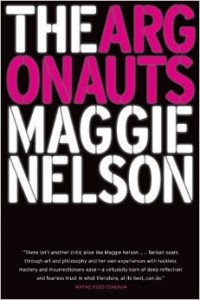160 pp, $23.00
Review by Jacob Spears
The unsettled prose in Maggie Nelson’s The Argonauts reflects the intractability of her concerns in writing about identity, personhood, and how we make relationships with others. The white space that surrounds each paragraph is a return to the fragmentary form she developed in Bluets, which also found Nelson using the intimacy of her life to write about larger cultural ideas. The Argonauts, however, is a more difficult work, interested in expressing concerns about gender and normativity without attempting to situate those concepts through a fixed discourse. Every bit as erudite as her previous book, The Art of Cruelty, though not as magisterial and academic, The Argonauts embarks on a voyage of exploration in which the ship, like the Argo, “designates molten or shifting parts, a means of asserting while also giving the slip,” intent on retaining “a sense of the fugitive.”
Though it swells in and out of its address, Argonauts unfolds mostly as a confessional written to the second-person ‘you’ that is her partner, the artist Harry Dodge, who very publicly underwent a transition from female to male through the course of their relationship. “Something about identity,” Nelson quips, “was loose and hot in our house.” As a memoir, Nelson’s account of intimacy is at turns light and disturbing, charming and uncomfortable. What if where I am is what I need? she asks, citing Deborah Hay. “Before you, I always thought of this mantra as a means of making peace with a bummer or even catastrophic situations. I never imagined it might apply to joy, too.” Argonauts is an attempt to chart this course in which her position and experience—like language—is anchored in the moment of exchange. A place, context, or sentence inevitably shifts understanding, performance, and intention.
Whether through pregnancy or identity-altering surgery, Nelson attempts to navigate the body as a shifting locus that still houses what we think of as personhood. Instead of disentangling the mess of the mind-body dualism in philosophical traditions, Nelson remains in the visceral and emotional experiences of her life in order to produce a new language for expressing the relationship between the two. Towards the end, Nelson focuses on the bodily aspects of her birth and the extreme physical experiences that mark them as her own and ineluctably form her sense of self; yet, paradoxically, so much of those experiences are not her, her body is “given away” to her child. While the experience of conceiving and carrying a child remains one of the experiences that constitute being a woman by most standards of normativity, Nelson’s embrace of her difficulties in conceiving and the pain of giving birth shatter any notions that there is a normal way to be a woman, and, thus, any correct way to inhabit a body.
When we think of the canon of minoritarian literature, be it Ralph Ellison, Doris Lessing, or Octavia Butler, we find in these intimately personal accounts that the Other is someone the majority can identify with. In this tradition, the marginalized demand the space of the center and beseech those already there to accept them as equals. This always implies that our differences can be shed to recognize the core humanist values of the West. Nelson has even utilized this mode before, seeking a shared identity through the feelings of the color blue. But Argonauts does not strive for the center; its partitioned paragraphs insist on difference. Even though this is Nelson at her most personal, she oscillates around the margins, never approaching the center. “There is something profound here,” she writes, “which I will but draw a circle around for you to ponder. Note, however, that a difficulty in shifting gears, or a struggle to find the time, is not the same things as an ontological either/or.”
The contours of Nelson’s circle are not smooth; instead, each reflection or revelation appears like a blip on the radar, each sign a beacon of the outposts the self travels to on its voyage. It would be a mistake to find a fluidity of self in Nelson’s account, as the transitions between how one understands their identity and their body are never smooth and steady. As a result, any attempt to be historical, which is what The Argonauts aims to be—a counterhistory of how we perceive ourselves in the world—must let the elisions and phantom traces of experience mark the jostlings and ruptures in which our bodies and our identities break apart in order to form new moments of being.
***
Jacob Spears has written reviews for [PANK] Magazine, Open Letters Monthly, and Hot Metal Bridge, the University of Pittsburgh’s graduate student journal, while he earned his MFA there.
![[PANK]](https://pankmagazine.com/wp-content/themes/pank/assets/images/pank-logo-large.png)

